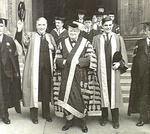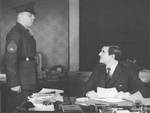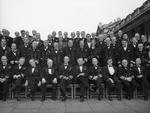John Winant
| Surname | Winant |
| Given Name | John |
| Born | 23 Feb 1889 |
| Died | 3 Nov 1947 |
| Country | United States |
| Category | Government |
| Gender | Male |
Contributor: C. Peter Chen
ww2dbaseJohn Gilbert Winant was born in the East Side of New York City, New York, United States into a upper middle class family, with his father being a partner in a real estate firm. In his younger years, he attended St. Paul's School in Concord, New Hampshire, United States and Princeton University in Princeton, New Jersey, United States; he was a poor student but he enjoyed academics nevertheless. Between 1913 and 1917, he was an instructor at St. Paul's School. As a teacher, he earned little money, but it bothered him little as he considered wealth unimportant.
ww2dbaseIn 1916, Winant entered public service as an elected member of the New Hampshire House of Representatives, where he was known as a leader among the progressive members of the Republican Party. As a state legislator, he introduced bills to restrict the work week for women and children to 48 hours, to support universal suffrage, to regulate wage standards, and to abolish capital punishment; not all of these efforts were successful, however.
ww2dbaseIn 1917, Winant joined the United States Army Air Service and was trained as a pilot. During WW1, he commanded the 8th Aero Squadron (Observation) in France at the rank of captain.
ww2dbaseWinant married Constance Rivington Russell, with whom he had a daughter and two sons.
ww2dbaseAfter WW1, in 1919, Winant returned to be an instructor at St. Paul's School. In 1920, he was elected to the New Hampshire Senate. Between 1925 and 1927 and again between 1931 and 1935 he was the governor of New Hampshire; as governor, he was a supporter of President Franklin Roosevelt's New Deal policies despite that Roosevelt was of the opposing political party. His support for Roosevelt was demonstrated by New Hampshire being the first state to fill Civilian Conservation Corps enrollment quota and it being the first state to cooperate with the National Resources Planning Board. During his tenure as governor his workaholism began to become more apparent, as he often skipped meals and worked late into the nights, at times even forgetting to attend dinner parties held at his home. In 1934, he was heavily involved in the Committee on Economic Security, an advisory group whose final report to Roosevelt influenced the creation of the Social Security Board. It was around this time that he decided to reject the calls by some of his fellow Republican Party members for him to run for presidency or vice presidency, and instead align himself closer to Roosevelt. In 1935, as the Social Security Board was formed, he was appointed its first chairman; he would serve two terms in this position, the first from Aug 1935 to Sep 1936 and the second from Nov 1936 to Feb 1937. He was credited for overcoming the initial great challenge of enumerating the American population with Social Security Numbers in a short period of time.
ww2dbaseDating back to Oct 1934, Winant had already expressed his interest in international politics to Roosevelt; as a result, he was recommended by Roosevelt to represent the United States in the International Labor Office based in Geneva, Switzerland, which was a part of the League of Nations. In Jan 1939, after his predecessor's resignation, he became the first American director of the ILO.
ww2dbaseIn 1941, Roosevelt appointed Winant as the ambassador to the United Kingdom; Winant would remain in this role through the end of WW2. Compared to his predecessor Joseph Kennedy, Sr., Winant showed much support for Britain's war efforts, and in turn was extremely popular among the British people, so much so that when the United Kingdom was threatened with a coal miner strike in mid-1942, he, as an expert in labor relations, was brought in by British Deputy Prime Minister Clement Attlee to help with this domestic situation. While in Britain, with the marriage between Winant and his wife strained, he carried on an affair with Prime Minister Winston Churchill's daughter Sarah Churchill.
ww2dbaseAs his political career had climaxed with the help of the rival political party, when Roosevelt died in 1945 Winant found himself estranged from the Republican Party which he was officially a member of. He resigned from his post as ambassador in Mar 1946; as he was departing Britain, Churchill noted that Winant "had been with us always.... He is a friend of Britain, but he is more than a friend of Britain - he is a friend of justice, freedom, and truth." President Harry Truman subsequently appointed him to represent the United States at United Nations Educational, Scientific and Cultural Organization (UNESCO), but Winant's actual involvement with the organization was fairly minimal. In 1947, he was made an honorary member of the Order of Merit; he was the second and last American (at the time of this writing in 2011) to receive this British honor.
ww2dbaseOn 3 Nov 1947, Winant committed suicide by firing a pistol into his right temple in his home in Concord, New Hampshire; the suicide was attributed to the depression brought on by his inability to adjust to the sudden transition from intense war time ambassadorship to a calm life of retirement. Before he passed away, he had wanted to be buried at St. Paul's School, but with suicide being a sin in Christianity the Episcopal rector of the school barred the burial, thus instead Winant was buried at the Blossom Hill Cemetery on North State Street in Concord, New Hampshire. His grave stone read a quote from him dated 23 Mar 1946:
ww2dbaseOn 25 Sep 1968, Winant's casket was moved to the cemetery St. Paul's School as he had wished before his death.
ww2dbaseSources:
Lynne Olson, Citizens of London
John Hare, "Eventually, Winant ended up at St. Paul's", Concord Monitor 5 Feb 2010
United States Social Security Administration
Wikipedia
Last Major Revision: Sep 2011
John Winant Interactive Map
Photographs
 |  |  |  |
John Winant Timeline
| 23 Feb 1889 | John Winant was born in New York City, New York, United States. |
| 23 Aug 1935 | John Winant became the first Chairman of the United States Social Security Board. |
| 16 Nov 1936 | John Winant began his second term as the Chairman of the United States Social Security Board. |
| 19 Feb 1937 | John Winant's second term as the Chairman of the United States Social Security Board ended. |
| 1 Mar 1941 | Mr. John Winant, the new United States Ambassador to the United Kingdom, was greeted by the Duke of Kent on his arrival by air. On his way to London by rail he was met and welcomed by His Majesty the King. |
| 6 Jun 1942 | John Winant spoke to a group of British coal miners in Durham, England, United Kingdom and persuaded them from striking. |
| 24 Sep 1944 | US Ambassador to the United Kingdom John Winant met with US Army Air Forces generals Carl Spaatz and Ira Eaker to discuss the possibility of conducting another major supply drop for resistance fighters in Warsaw, Poland. They concluded that similar missions should not be conducted due to the closure of US bases in the Soviet Union (the closure was planned for 5 Oct 1944), the shortening of daylight hours, and the rate of aircraft loss. |
| 3 Nov 1947 | John Winant committed suicide in his home in Concord, New Hampshire, United States. |
| 25 Sep 1968 | John Winant's remains were moved from Blossom Hill Cemetery to St. Paul's School cemetery, Concord, New Hampshire, United States. |
| 26 Sep 1968 | John Winant's grave stone was moved from Blossom Hill Cemetery to St. Paul's School cemetery, Concord, New Hampshire, United States; his casket had already been moved to St. Paul's School cemetery on the previous day. |
Did you enjoy this article or find this article helpful? If so, please consider supporting us on Patreon. Even $1 per month will go a long way! Thank you. Share this article with your friends: Stay updated with WW2DB: |
» Message from Welles to Winant
» Messages between Hull and Winant
Related Books:
» Citizens of London
- » 1,150 biographies
- » 337 events
- » 44,024 timeline entries
- » 1,241 ships
- » 350 aircraft models
- » 207 vehicle models
- » 375 weapon models
- » 123 historical documents
- » 260 facilities
- » 470 book reviews
- » 28,582 photos
- » 432 maps
General Douglas MacArthur at Leyte, 17 Oct 1944
Please consider supporting us on Patreon. Even $1 a month will go a long way. Thank you!
Or, please support us by purchasing some WW2DB merchandise at TeeSpring, Thank you!